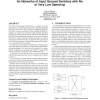Free Online Productivity Tools
i2Speak
i2Symbol
i2OCR
iTex2Img
iWeb2Print
iWeb2Shot
i2Type
iPdf2Split
iPdf2Merge
i2Bopomofo
i2Arabic
i2Style
i2Image
i2PDF
iLatex2Rtf
Sci2ools
147
click to vote
CCR
2006
2006
Low complexity, stable scheduling algorithms for networks of input queued switches with no or very low speed-up
The delay and throughput characteristics of a packet switch depend mainly on the queueing scheme and the scheduling algorithm deployed at the switch. Early research on scheduling algorithms has mainly focused on maximum weight matching scheduling algorithms. It is known that maximum weight matching algorithms guarantee the stability of input-queued switches, but are impractical due to their high computational complexity. Later research showed that the less complex maximal matching algorithms can stabilize input-queued switches when they are deployed with a speed-up of two. For practical purposes, neither a high computational complexity nor a speed-up of two is desirable. In this paper, we investigate the application of matching algorithms that approximate maximum weight matching algorithms to scheduling problems. We show that while having a low computational complexity, they guarantee the stability of input queued switches when they are deployed with a moderate speed-up. In particular...
Related Content
| Added | 11 Dec 2010 |
| Updated | 11 Dec 2010 |
| Type | Journal |
| Year | 2006 |
| Where | CCR |
| Authors | Claus Bauer |
Comments (0)

